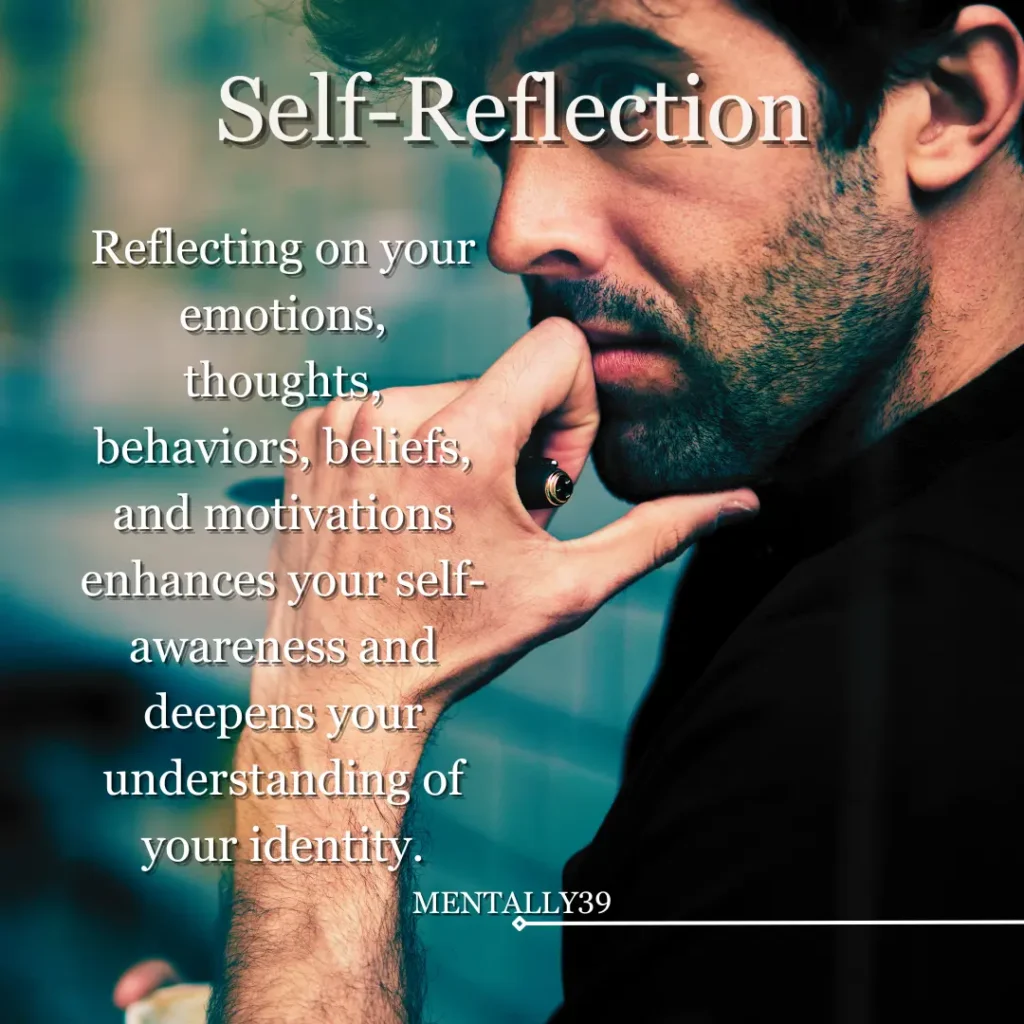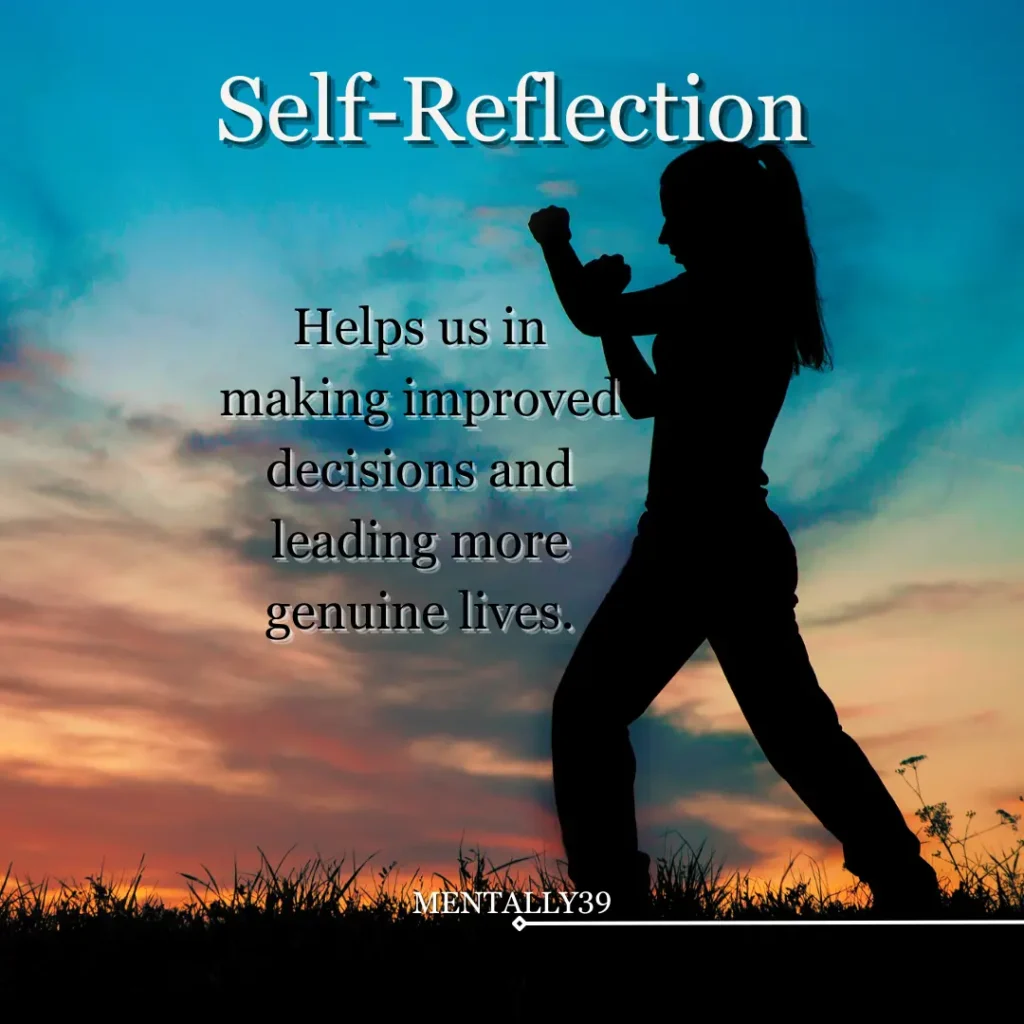“The unexamined life is not worth living.” – Socrates
This post contains affiliate links that help support the website.
Self-reflection is taking time to think about yourself, how you feel, and why you do things. It can help you learn more about yourself and grow as a person. When you use these tips for self-reflection, you can make better choices and become a better version of yourself.
In this article, we will explain why self-reflection is important, the advantages it offers, and practical ways to add self-reflection strategies to your daily routine. By taking some time to self-reflect, you can get some helpful insights and develop better relationships with yourself and others.
Key Takeaways:
- Self-reflection is an important exercise that can help people achieve personal growth and increase their self-awareness.
- Understanding our thoughts, feelings, and behaviors gives us insights into our motivations and values.
- Perfecting self-reflection helps us make better decisions and live more authentic lives.
- Setting aside dedicated time and implementing effective strategies can enhance the practice of self-reflection.
- Self-reflection leads to personal change and improved relationships with ourselves and others.
Table of Contents
What is Self-Reflection?
Looking within yourself to gain a better understanding of your thoughts, actions, and values is called self-reflection. It’s like taking a moment to think about your thoughts and feelings.
When you self-reflect, you’re taking a closer look at why you do things and feel certain ways. This can help you recognize your strengths and weaknesses, see patterns in your behavior, and identify areas where you can improve. When we take the time to understand ourselves better, we can discover what truly matters to us.
Looking at yourself and thinking about how you want to grow can help you determine what’s most important. It can help you make the right choices instead of just doing what others want you to do. By knowing yourself better, you can live a life that feels true to you and what you want.
Why is Self-Reflection Important?
Self-reflection is a process that helps you grow as a person and not lose sight of what is important to you. It’s necessary because we often get caught up in the day-to-day pace and forget what’s truly important to us. By thoughtfully considering your feelings, actions, values, and goals.
By understanding yourself better, you can also improve your relationships with others.
By practicing self-reflection, you can develop important skills like self-awareness and emotional intelligence, which are essential for navigating life’s challenges. Self-awareness helps you recognize your strengths, weaknesses, and areas for improvement, which helps you become a better version of yourself.
Living authentically means being true to yourself and your values. It also helps you break free from societal pressures and expectations, which leads to a more fulfilling life.
Benefits of Self-Reflection
Self-reflection offers a wide range of benefits that contribute to personal development and well-being. Here are some key advantages:
- Enhances self-awareness by helping you understand your thoughts, emotions, and behaviors and identify patterns, strengths, and areas for improvement.
- Reflecting on your values, goals, and motivations can lead to more informed decisions aligned with your authentic self and greater fulfillment.
- Self-reflection enhances emotional intelligence and empathy, improving understanding of others and fostering healthier relationships.
- Confidence and self-acceptance: you can build confidence by acknowledging your achievements, strengths, and growth. It also promotes self-acceptance by embracing your imperfections and owning your uniqueness.
- Continuous self-improvement: is a valuable tool for setting and achieving meaningful goals, identifying areas for growth, and continuously striving towards self-improvement.
Strategies for Effective Self-Reflection
While personal reflection is an individual and introspective process, there are several strategies you can use to make it more effective:
- Set aside dedicated time: Schedule a regular time for yourself in a peaceful environment where you can focus on your thoughts and emotions.
- Use prompts or questions: Use questions that make you think deeply about different parts of your life. This can help you learn more and understand things in a way you may not have before.
- Keep a reflective journal: Jotting down your thoughts and feelings can be helpful in keeping a record of your self-reflection journey. This way, you can monitor your progress, spot recurring themes, and find ways to improve.
- Seek feedback from others: It’s important to talk to people you trust, like friends, mentors, or therapists, and be honest with them. They can give you good advice and help you learn more about yourself.
Experiment with these strategies and find what works best for you. Remember, self-discovery is a lifelong journey.
| Benefits of Self-Reflection | Strategies for Effective Self-Reflection |
|---|---|
| Enhanced self-awareness | Set aside dedicated time |
| Improved decision-making | Use prompts or questions |
| Stronger relationships | Keep a reflective journal |
| Confidence and self-acceptance | Seek feedback from others |
| Continuous self-improvement |

Benefits when you Practice Self-Reflection
When you self reflect on your thoughts, feelings, and actions, it can help you better understand yourself and grow as a person. This process, called self-reflection, can give you valuable insights into who you are.
- When you take time to think about yourself, your feelings, thoughts, actions, beliefs, and what drives you, you become more aware of who you are. This helps you make choices that match your values and what you want to achieve.
- Looking within yourself and reflecting to understand your true passions and desires can lead to personal development. You can live a more authentic and satisfying life by gaining clarity on what matters most to you.
- When you think about yourself and your feelings, it can help you feel better mentally. It allows you to understand things better, let go of bad thoughts, and feel less worried or stressed out.
- Improved Decision-Making Skills: Looking back at your past experiences and thinking about them can help you learn and make better decisions. When you know your habits, beliefs, and opinions, you can make more clear and confident choices.
- Strengthened Relationships: By looking at yourself and how you feel, you can learn to better understand and care about others. This is called emotional intelligence and empathy, and it helps you build strong relationships with people. When you know your own emotions and thoughts, you can relate to others in a meaningful way.
- Promotion of Continuous Self-Improvement: Thinking about yourself and how you can become better can help you grow and improve. If you regularly examine your thoughts, actions, and goals, you can set important targets and work hard to improve yourself.
Taking the time to consider yourself and how you act can help you become a better person and feel happier with your life. This is because you will get to know yourself better and learn how to improve.
Effective Tips for Self-Reflection
To gain the advantages of self-reflection, it’s important to develop habits that help you incorporate reflection into your daily life. You can do this by following strategies that create a routine for practice and performing a personal review every three months. This will help you understand your thoughts, emotions, and behaviors better.
Anchor self-reflection to everyday experiences
A good way to rehearse self-reflection is to link it to daily activities. For instance, journaling your thoughts while drinking your morning coffee or leaving a meeting room. This helps you remember to take a break and reflect on yourself regularly, so it becomes a regular part of your day.
Develop a structured routine
Developing a structured routine for introspection is an effective strategy to enhance personal growth. You can allocate a specific time every day, week, or month to reflect on your progress, accomplishments, and things you appreciate. By emphasizing the positive aspects and integrating self-awareness into your routine, you can cultivate a more balanced and mindful approach toward your personal development.
Incorporate prompts
Here’s a simpler version: One way to understand yourself better is to ask yourself questions. These questions can be about what you learned, what problems you faced, how you overcame them, and what you can do to be better. Answering these questions can help you learn more about your thoughts, feelings, and actions. I like to use a journal, taking the time to think. Doing so allows you to consider your mood, actions, and reactions.
Set aside dedicated time for focused self-reflection
It’s important to take some time for yourself to think about when things aren’t going your way and when they are. You can do this by setting aside a specific time each week or every few months to reflect on your goals, progress, and things you can do better. Self-reflection allows us to improve as individuals, partners, and friends.
Conclusion
Simply taking some time to consider yourself and your life can lead you to improve your circumstances. Learn from your past, putting pen to paper. This helps you learn more about who you are, make better choices, and grow as a person. By using some helpful tips and tricks every day, you can get these benefits and become more self-aware.
Taking time to reflect on yourself can help you learn more about your thoughts, feelings, actions, goals, and values. This exploration can help you live a more genuine and satisfying life by aligning your behaviors with your values and goals. By improving your self-awareness, you can make better decisions, build stronger relationships with yourself and others, and improve your overall health and happiness.
To improve your self-awareness, establish a consistent routine that includes specific time for reflecting on your thoughts and feelings. Use prompts or questions to guide your reflection process and connect your reflections to your daily experiences. Take a moment to pause and consider your thoughts and emotions in order to gain useful insights. Regularly reflecting on yourself can make positive changes in your life and learn more about who you are as a person.

20+ Years as a Special Education Teacher
NASM Certified Nutrition Coach,
Certified Trauma Informed Trainer
Mindset and Motivation Master Life Coach
